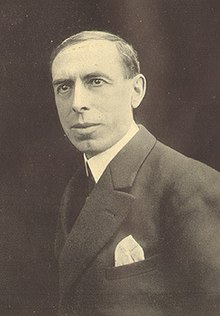Luigi Maggi: Difference between revisions
Content deleted Content added
MrKeefeJohn (talk | contribs) No edit summary |
→Selected filmography: added new film to listing |
||
| Line 24: | Line 24: | ||
*''[[Il guanto]]'' (''The Glove'') (1910), a [[List of rediscovered films|rediscovered lost film]] |
*''[[Il guanto]]'' (''The Glove'') (1910), a [[List of rediscovered films|rediscovered lost film]] |
||
*''{{ill|Nozze d'oro|it}}'' (''After Fifty Years'', ''The Golden Wedding'') (1911) |
*''{{ill|Nozze d'oro|it}}'' (''After Fifty Years'', ''The Golden Wedding'') (1911) |
||
* ''The Queen of Nineveh'' (1911) |
|||
*''{{ill|Il fornaretto di Venezia (1914 film)|lt=Il fornaretto di Venezia|it|Il fornaretto di Venezia (film 1914)}}'' (1914), with [[Paola Pezzaglia]] |
*''{{ill|Il fornaretto di Venezia (1914 film)|lt=Il fornaretto di Venezia|it|Il fornaretto di Venezia (film 1914)}}'' (1914), with [[Paola Pezzaglia]] |
||
*''{{ill|La bambola vivente|it}}'' (1924) |
*''{{ill|La bambola vivente|it}}'' (1924) |
||
Revision as of 19:54, 12 April 2023
Luigi Maggi | |
|---|---|
 | |
| Born | 21 December 1867 |
| Died | 22 August 1946 (aged 78) Turin, Piedmont, Italy |
| Occupation(s) | Actor, director |
| Years active | 1906–1928 |
Luigi Maggi (21 December 1867 – 22 August 1946) was an Italian actor and film director who worked prolifically during the silent era. Working for Ambrosio Film he co-directed the 1908 hit film The Last Days of Pompeii, which launched the historical epic as a popular Italian genre.[1]
Selected filmography
Director
- Gli ultimi giorni di Pompei (The Last Days of Pompeii) (1908)
- Nerone (Nero) (1909)
- Galileo Galilei (1909)
- Il guanto (The Glove) (1910), a rediscovered lost film
- Nozze d'oro (After Fifty Years, The Golden Wedding) (1911)
- The Queen of Nineveh (1911)
- Il fornaretto di Venezia (1914), with Paola Pezzaglia
- La bambola vivente (1924)
References
- ^ Moliterno p.6
Sources
- Moliterno, Gino. Historical Dictionary of Italian Cinema. Scarecrow Press, 2008.
- Winkler, Martin M. Troy: From Homer's Iliad to Hollywood Epic. John Wiley & Sons, 2009.
External links
- Luigi Maggi at IMDb
